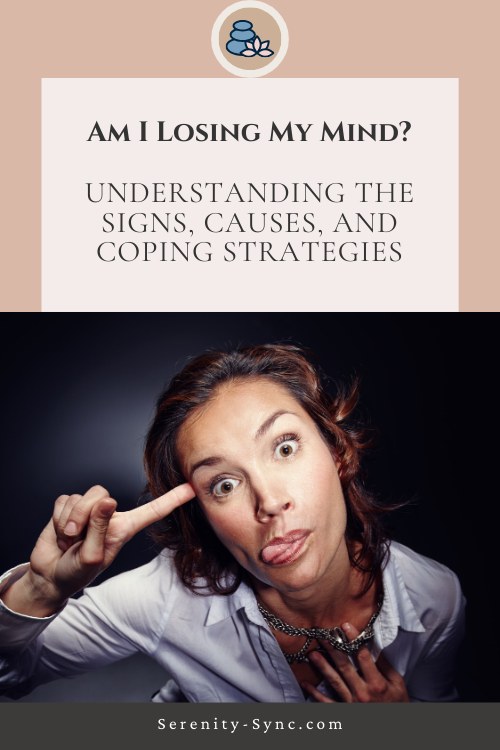In Brief
Have you ever wondered Am I Losing My Mind ? Feeling like you’re losing your mind can be overwhelming, often linked to increased stress and anxiety. Recognizing these feelings is crucial for self-awareness and seeking help. This post delves into symptoms, reasons behind this sensation, coping mechanisms, and the importance of professional support in regaining stability.
Exploring the Feeling of “Losing My Mind”
Have you ever experienced moments where you question your sanity? Feeling like you’re losing your mind can be disorienting, leaving you with a mix of emotions. It’s essential to understand these feelings to address them effectively. Let’s unravel the complexities of this sensation together.
Fun Fact
Taking deep breaths can help alleviate feelings of losing your mind by calming your nervous system and promoting relaxation.
Symptoms of Feeling “Losing My Mind”
When you feel like you’re losing your mind, your body and mind can exhibit various signs. These can range from physical manifestations like headaches and fatigue to emotional symptoms such as irritability and mood swings. The variability of these symptoms can make it challenging to pinpoint the exact cause, emphasizing the need for self-awareness.
Physical and Emotional Manifestations
Physical symptoms may include headaches, muscle tension, insomnia, and fatigue. On the emotional side, you might experience irritability, mood swings, and a sense of detachment. These manifestations can disrupt your daily life and contribute to feelings of distress.
Variability of Symptoms
The symptoms of feeling like you’re losing your mind can vary from person to person. While some individuals may primarily exhibit physical signs, others might predominantly display emotional indicators. Understanding the diversity of symptoms can aid in recognizing and addressing them effectively.
Signs of Stress Response
Feeling like you’re losing your mind can often be a response to heightened stress levels. Your body’s way of reacting to stress can manifest in various ways, including physical discomfort, emotional turmoil, and cognitive challenges. Recognizing these signs can be the first step towards managing stress effectively.
Reasons Behind Feeling “Losing My Mind”
Several factors can contribute to the sensation of losing your mind, from stress triggers to underlying mental health conditions. Identifying these reasons is crucial for developing coping strategies and seeking appropriate support to regain a sense of stability.
Stress as a Trigger
Stress is a common trigger for feeling like you’re losing your mind. Whether it’s work-related pressures, relationship difficulties, or financial concerns, stress can significantly impact your mental well-being. Learning to manage stress effectively is key to alleviating this sensation.
Impact of Anxiety Disorders
Anxiety disorders can exacerbate feelings of losing control or sanity. Conditions such as generalized anxiety disorder, social anxiety disorder, or panic disorder can intensify symptoms like racing thoughts, palpitations, and overwhelming fear. Seeking professional help is essential for managing anxiety-related sensations.
Understanding Panic Disorder
Panic disorder can also contribute to the sensation of losing your mind. The sudden onset of intense fear or discomfort, accompanied by physical symptoms like sweating, trembling, and shortness of breath, can be overwhelming. Developing coping strategies and receiving appropriate treatment are vital for navigating panic disorder effectively.
Fun Fact
Did you know that feeling like you’re losing your mind can sometimes be a sign of your brain’s way of telling you to slow down and take a breather?
Coping Mechanisms for Managing
Emphasizing Self-Awareness
Self-awareness is the cornerstone of effective stress management. By being in tune with your emotions, thoughts, and triggers, you can better understand how to navigate through challenging situations. Recognizing when you are feeling overwhelmed and acknowledging your emotions are the first steps towards building resilience. Through self-awareness, you can identify patterns in your behavior and thought processes, enabling you to proactively address stressors before they escalate.
Importance of Seeking Professional Help
Seeking help from a mental health professional is a crucial step in managing anxiety and stress. Therapists and counselors are equipped with the tools and knowledge to guide you through challenging emotions and provide valuable coping strategies. They can offer a safe space for you to express your feelings, gain insights into your thought patterns, and develop effective coping mechanisms tailored to your needs. Remember, reaching out for help is a sign of strength, not weakness.
Exploring Coping Strategies
Coping strategies are diverse and vary from person to person. From mindfulness practices and deep breathing exercises to engaging in hobbies and seeking social support, there are numerous ways to manage stress and anxiety. Exploring different coping mechanisms allows you to discover what works best for you. Building a toolbox of strategies enables you to navigate through difficult times with resilience and grace.
Seeking Help
Seeking help and talking to a therapist can not only help you navigate through the feeling of losing your mind but also improve your overall mental well-being. In extreme cases, stress and anxiety from feeling like you’re losing your mind can actually cause physical symptoms like headaches and muscle tension.
Conclusion
In conclusion, managing anxiety and stress requires a multi-faceted approach that encompasses self-awareness, seeking professional help, and exploring coping strategies. By prioritizing your mental well-being and taking proactive steps to address your stressors, you can navigate through challenging times with resilience and grace. Remember, it’s okay to seek help and prioritize your mental health – you deserve to feel empowered and supported on your journey towards holistic well-being.

